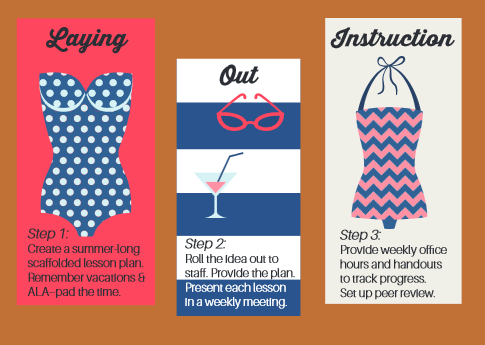LibGuides--we've all got them. The biggest issue with LibGuides is that almost as soon as we put them on the web, they get out of date. Most librarians make an effort to review course guides when a class comes over for instruction, but subject guides and LibGuides made for classes that have not come over in a while are not updated or overhauled frequently. Since these are on the open web, broken links, out-of-date databases, and other errors can lead patrons to dead ends. Sometimes a cursory glance to make minor changes is OK, but new initiatives can mean a total overhaul of how LibGuides are presented or organized (for instance, a change in catalog, updates to tutorials, and more). Instead of leaving our garbage lying around, librarians can use make use of commonly known instructional concepts to plan a summer-long team project. Some commonly known instructional concepts that are used for the project are scaffolding, modeling, lesson planning, office hours, and peer review. One librarian acts as the organizer of the project by creating a lesson plan at the beginning of summer that lays out the LibGuides updates for the entire summer in two- to three-week increments. In a short departmental meeting, the librarian models the action that needs to be taken during that two-week period by bringing up a LibGuide on the screen and each module builds on the last (scaffolding). Depending on the LibGuides knowledge/tech level of the librarians on your team, you can offer an office hour for people to stop by to get help. By the end of the summer, each individual's LibGuides are updated. From my recent poster, here are the steps:
 |
| Image Credit: Katy Kavanagh Webb |
Since the project is team-based, everyone on the team is in it together and can help each other, if needed. Peer review also ensures that the work gets done. If you are looking for ideas for updates to include in your LibGuides Summer Project, here are some ideas.
 |
| Image Credit: Katy Kavanagh Webb |
Want to know more? To read my College and Research Libraries' News article on the LibGuides Summer Project, click here.
To view a poster I presented at the NCLA Biennial Conference about the Summer Project, click here. This is a link to the ECU Institutional Repository, so you will have to click on the PDF at the top to view the poster.
There is a zip file with planning documents if you would like to do this at your own institution here.
Hope to see some of you in Pittsburgh in May! If so, you'll already have an idea of what I am talking about.
No comments:
Post a Comment